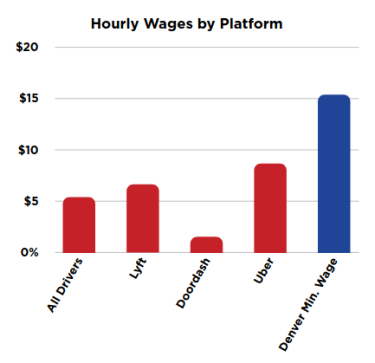
Plus: platform work and AI.
Leaving Twitter Means a New Mindset
Elon Musk's takeover of Twitter has prompted millions of people to shift their attention to alternative platforms, including the free, open-source social network Mastodon. MEDLab director Nathan Schneider co-founded the cooperatively governed Mastodon server Social.coop after mounting a shareholder campaign at Twitter in 2017, and he has been sharing lessons from the experience:
- A new article at Noema with CU Denver professor Amy Hasinoff argues that moving to Mastodon means making a shift from "scalability" to "subsidiarity" (read the research behind it here)
- An interview in the Denver magazine 5280 about Twitter and its alternatives
- A primer on how to create a community-governed Mastodon server, drafted with fellow Social.coop members
Conditions among Colorado Rideshare Drivers
$5.49 per hour. That’s how much, on average, rideshare drivers in the Boulder-Denver Metro area earn, per hour, after accounting for expenses. In contrast, the minimum hourly wage in Denver is as of 2022 is $15.87. Rideshare drivers, unlike minimum wage workers, are independent contractors which means that they are not entitled to minimum wage. In addition, as independent contractors, rideshare drivers are liable for the covering the expenses associated with “being your own boss.” These hidden costs are what eat away at drivers’ wages. However, systematically tracking these hidden costs and using this information to develop a counter narrative to rideshare platforms’ claims about workers’ wages is a technically difficult task.
The Guardian recently featured the work of MEDLab research fellow Samantha Dalal, who worked with local labor organizers to study the economic conditions of Colorado rideshare drivers. Read more on the MEDLab blog.
Looks Like New: AI Snake Oil
Our radio show, Looks Like New, airs across Colorado's Front Range on the fourth Thursday of every month. If you can't catch it then, subscribe to the podcast. Here's what was on this month, hosted by Samantha Dalal:
Many of us may not realize that artificial intelligence, or AI systems, are increasingly being used to make decisions that affect your everyday life, from insurance to hiring. While AI has been a popular buzzword over the last few years, it is worth asking what it is and even more, what it is actually capable of. We had a conversation with Sayash Kapoor, a researcher at Princeton University, whose work explores the implications of the glamorization of AI systems.

